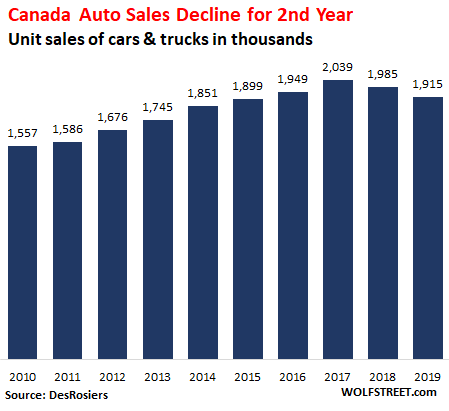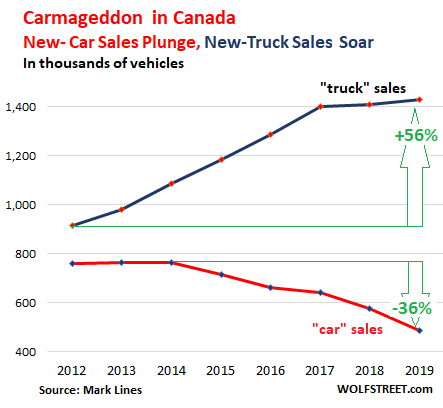Sales fall for second year in a row, as car sales collapse further and truck sales barely tick up.
By Nick Corbishley, for WOLF STREET:
Sales of passenger cars and light trucks in Canada fell 3.7% to 1.91 million vehicles in 2019, the second year in a row of declines, and were down 6.1% from peak-year 2017, according to industry data compiled by Des Rosiers Automotive Consultants:

These sales are new vehicles that dealers delivered to their customers, or that automakers delivered directly to large fleets, such as rental car fleets. Leases are included as dealers sell these units to leasing companies which then lease them to the customer.
As has been the case in the US – a phenomenon I’ve come to call Carmageddon — “car” sales plunged 16.1% in 2019 from very already low levels to even lower levels, to 484,687 units, after having dropped every year since 2014. The share of car sales as a percent of total new vehicle sales dropped to 25% in 2019 from a share of 45% in 2012.
And truck sales rose 1.6% to 1.43 million units, for a share of 75% of total new vehicle sales, up from a share of 55% in 2012. The category of “trucks” includes pickups, SUVs, compact SUVs, and vans. Since 2012, car sales have plunged 36% while “truck” sales have soared 56%.
This chart of Carmageddon in Canada also shows how truck-sales growth has stalled over the past two years, as car sales have plunged; hence, the overall sales decline in those two years:

The dividing line between “cars” and “trucks” that the industry has been using since Adam and Eve is probably no longer relevant: Compact SUVs and subcompact SUVs, when they were established by the industry some years ago as categories, were classified as “trucks,” mostly for marketing reasons because it would allow automakers to charge higher prices for them.
But compact SUVs are based on a car chassis with a car powertrain and car components. They just sit a couple of inches higher off the ground than a car, and their roofline isn’t as low-slung as that of a car. These compact and subcompact SUVs are very popular, and the fact that they’re classified as “trucks” instead of “cars” is a big driving force behind Carmageddon.
Most mass-market brands (I define them as having a market share of at least 2%) experienced declining sales in 2019, except Toyota, Hyundai, and Kia.
Ford sales, according to estimates by Des Rosier (laggard Ford will announce its deliveries on Monday after everyone else announced their deliveries on Friday), dropped 3.4% to 287,900 units in 2019, which allowed Ford to hang on to its place in Canada, with a market share of 15%.
General Motors sales plunged 10.9% for the year, to 256,795 units, putting GM again in second place behind Ford, with a market share of 13%. The 2% uptick in Q4 deliveries, after the battering sales had taken in the prior quarters, caused the press release to crow, “We achieved solid year-end results in 2019,” while also noting that “Canadian consumer preferences shifted significantly toward crossovers, SUVs and pickups in 2019.” Namely Carmageddon.
The press release only pointed out the good stuff: Buick’s China-made compact SUV, the Envision, and the South Korean-made compact SUV Encore were hot, with sales rising 19.9% and 21.7% respectively in the fourth quarter. And GM’s pickup sales were hot too, with Chevrolet Silverado and GMC Sierra sales rising 10.9%.
Toyota sales ticked up 1.9% for the year to 211,551 units, and its Lexus brand sales rose 5.9% to 25,540 units, for a combined 237,091 units (+2.4% combined), which put Toyota in third place, with a market share of 12.4%. The press release gushed that Toyota Canada “ended the decade on a high note with its best sales year ever.” Some standouts:
- Toyota truck and SUV sales rose 5.6% for the year to a record of 153,117 units, or 72% of its total sales.
- Within this group, sales of the new RAV4 Hybrid soared 82% to 14,246 units.
- And the Camry? The press release was about trucks and SUVs, and it did not even mention the Camry which has gotten caught up in Carmageddon.
FCA sales, in fifth place, inched down 0.8% in 2019, to 223,101 units, for a market share of 11.7%. Its Fiat and Alfa Romeo brands only sell a few hundred cars a year and don’t matter. FCA’s cars are being killed off methodically, visually reemphasized in its press release, which showed three photos: two of SUVs and one of a pickup.
- Ram sales rose 14% to 102,000 units in 2019, which is 46% of FCA’s total sales in Canada! This is powered by Ram truck sales, which rose 14% for the year to 85,000 units. Ram-brand van sales also rose but the numbers were small.
- Jeep sales ticked down 2% for the year, as Cherokee sales collapsed 34%, Renegade sales collapsed 44%, and Compass sales plunged 19%, but as Grand Cherokee sales soared 38% and Wrangler sales ticked up 4%.
- Chrysler sales plunged 40% for the year, to just 9,220 units, as the brand has phased out its car models, whose sales have collapsed into nothingness. This brand is dead.
- Dodge sales plunged 15% as car sales under the brand collapsed into nothingness, as these cars have been phased out, and Caravan sales plunged 15%. But sales of the Durango SUV soared 33% to a whopping 9,220 units in 2019.
Sales of the other brands in 2019 with a share of 2% or higher.
- Honda and Acura sales dropped 3.1% to 169,047 units, for a market share of 9.8%.
- Hyundai sales rose 4.2% to 152,988 units, increasing its market share to 7.0%.
- Nissan sales dropped 9.4% in 2019 to 123,755 units for a market share of 6.5%.
- Volkswagen, Audi, and Porsche sales combined fell 5.9% to 112,000 units, for a market share of 5.9%.
- Kia sales rose 5.0% to 76,630 units, increasing its market share to 4.0%.
- Mazda sales dropped 10.1% to 66,420 units, for a market share of 3.5%.
- Subaru sales edged down 0.9% to 57,524 units for a market share of 3.0%.
- Mercedes-Benz sales dropped 7.3% to 45,828 units for a market share of 2.4%.
- BMW sales dropped 6.1% to 36,658 units, and its market share dropped below 2%; so theoretically, it should have fallen off this list.